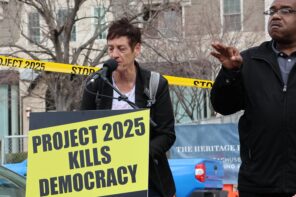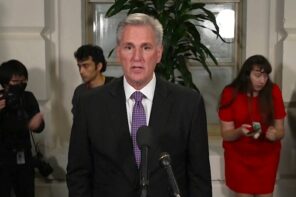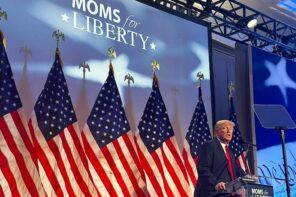Glenn Beck’s efforts to transform himself from Fox News demagogue into a religious leader for Tea Party America has a lot of commentators discussing the feasibility of a Mormon convert leading a wary evangelical and Catholic right in a faith-driven cause. While there are significant roadblocks hindering Beck’s quest for leadership in the Christian Right, he wouldn’t be the first Mormon to advocate a right-wing alliance that stretches across faiths. Beck follows hundreds of Mormon “pro-family” activists who have united with conservative Catholics and evangelicals to form a common front in the culture wars.
Since 1997, when Beck was just a baby Mormon, a coalition of mostly US-based religious right groups, the World Congress of Families, has attempted to rally religious conservatives at international “pro-family” conferences to transcend theological differences to unite against common enemies: feminism, homosexuality, liberal attitudes towards sexuality and reproductive rights, and the separation of church and state.
The WCF followed the rise of a global conservative movement in response to international conferences in the 1990s, particularly concerning reproductive or women’s rights, which they feared could affect US law back home. At the 1994 Cairo Conference on Population and Development, Pope John Paul II (an early bridge-builder who’d allied himself with Billy Graham and Campus Crusade for Christ in the 1970s) called for interfaith opposition to the conference’s draft program of action due to its support for abortion rights and what the Pope called a “Culture of Death.”
As a result, the Vatican formed a “pro-family” bloc with conservative Muslim states, and inspired a cross-cutting crowd of religious conservatives to begin attending other UN conferences, such as the following year’s Fourth World Conference on Women in Beijing, or its five-year review in 2000, where conservative activists ran amok.
Jennifer Butler, executive director of Faith in Public Life and author of Born Again: The Christian Right Globalized, served as UN representative of the Presbyterian Church (USA), where she witnessed the beginning of conservative activism at the UN, bullying its way into influence at the international level. She recalls the chills she felt in 2000, when right-wing Catholic activist and WCF member Austin Ruse, of the Catholic right-wing group C-FAM, “sent around a note asking the Abrahamic faiths to rise up together.”
Ruse, a convert to Catholicism, invited conservatives to the UN’s Beijing + 5 review, declaring, “You will work alongside Catholics, Evangelicals, Jews, Muslims, and Mormons… We are the children of Abraham arising to fight for faith and family.” He succeeded, Butler reports, in drawing 300 activists as part of the conference’s 3,000 total attendees.
As a result of this call—and elite support from “powerful international players in the Vatican, US business, and politic[s]” who encouraged Catholic, Mormon and evangelical leaders into partnership—UN conferences began to be transformed, from the normally subdued forum for conversation among NGOs to stages for right-wing theater where protesting monks would seat themselves in the formation of a cross, Mormon youth activists seized control of a youth caucus to deliver a right-wing statement “from the worlds’ youth,” and Muslim and Christian NGOs would partner to forward a conservative agenda.
It is, in action, what Christian Right luminary Francis Schaeffer described as “co-belligerency,” an interfaith cooperation that transcends doctrinal differences. It was an early goal of the WCF too, as WCF secretary and co-founder Allan Carlson described in his book The New Agrarian Mind, when he declared a conservative imperative to “build an international movement of ‘religiously-grounded family morality systems’ that can influence and eventually shape social policy at the United Nations.”
Carlson, the Lutheran head of the Illinois-based Howard Center for Family, Religion, and Society, is a compelling conservative historian who uses secular arguments to advance religious right ideas. A chief example of this is “The Natural Family Manifesto,” a guiding document of the WCF community, co-written by Carlson and Paul Mero, head of the Mormon think tank the Sutherland Institute. The ecumenical call to arms extols a conservative lifestyle where fathers lead and women honor their highest domestic calling by becoming “prolific mothers” of “full quivers of children.”
In service of that goal, Carlson, who has helped craft policy for ultra-right Senator Sam Brownback and Representative Lee Terry of Nebraska, hopes to involve the state in a pro-family welfare system, where tax laws encourage large families, and the government encourages a family-and-faith-centered legal system, which repeals “witch-hunting” child abuse laws that restrict parental discipline as well as no-fault divorce; imposes penalties for unmarried cohabitation; and reconfigures Social Security to provide support on a family, rather than individual basis, so that women are recognized not for their work as independent employees but for their roles as spouses and mothers.
Doris Buss and Didi Herman, law professors and co-authors of Globalizing Family Values: The Christian Right in International Politics, write that the Manifesto’s secular, social science rationales are part of the “‘intellectualization’ of the Christian Right”—largely a contribution of Mormon lawyers and academics like Mero.
“[In] response to the perceived ideological and political successes of its feminist and gay rights opponents,” Buss and Herman argue, the Christian Right, “has developed a powerful counter-discourse. A potent mix of religious doctrine and social science, the [Christian Right’s] ‘new family theology’ is anchoring its ‘natural family’ politics, domestically and internationally.” The quasi-scientific focus also makes sense as a hedge against interdenominational conflict, as the culture war goals of this coalition are de-sublimated: translated from biblical mandate to scientific instructions for better living through traditionalism.
According to Buss and Herman, documents like the Manifesto, embody “a mixture of divinity and data,” Scripture and conservative social science. They serve to codify “a new family theology” and orthodox doctrine for a coalition working across denominational lines and traditions. The result, they see, is “an ever-increasing convergence in ideology among the different sectors of the Christian Right,” wherein conservative members of different faiths have more in common with each other than with the liberal members of their own churches.
Despite the relatively low attendance at its conferences the WCF and its affiliated manifesto don’t represent voices in the wilderness, but draw a number of heavyweight Christian right groups, from the Heritage Foundation, the Family Research Council, Concerned Women for America, and Focus on the Family, who network with representatives from the Vatican, Mormon scholars, conservative evangelicals and Catholics from developing nations, and a few Muslim leaders seeking allies to fight gay and women’s rights at the UN.
The result is the spread of US culture-war tactics across the globe—from the Czech Republic to Qatar, where right-wing Mormon activist and WCF cofounder Richard Wilkins has found enough common cause with Muslim fundamentalists to build the Doha International Institute for Family Studies and Development.
Wilkins joked to Butler that the coalition was “a very loose one of many good friends who are convinced I am going to burn in hell.” But the jocularity of his admission also seems to indicate how willing many coalition members are to set aside differences in belief that they see as heretical or false teaching to make common cause.
The WCF is not alone in seeing the potential in this kind of alliance. Peter Kreeft, right wing convert to Catholicism and professor of philosophy at Boston College, argues in his 1996 book Ecumenical Jihad: Ecumenism and the Culture War, that religious culture warriors must recongnize a substantial shift in alliances, between former enemies like Muslims, and former friends like Humanists. While the idea of Muslim-Christian alliance seems particularly far-fetched at the end of this summer, Kreeft’s larger point has resonated with a number of religious leaders. Echoing Pope John Paul II’s prediction that third millennium could be marked by a unified Christianity, Kreeft predicted: “The age of religious wars is ending; the age of religious war is beginning: A war of all religions against none.”
Ultimately, the WCF doesn’t draw the numbers of other global alliances like the World Social Forum. In 2007, for example, the WCF drew only 3,000 or so attendees; but among them were top members of the far-right government of Poland, a country that the WCF considers at the vanguard of the ecumenical culture war for its vicious repression of gay and reproductive rights. What the WCF does continue to do very successfully is serve as an assembly point for a number of highly connected religious right actors who mingle with leaders from Africa, Eastern Europe, and Latin America to further an American-born agenda.
So while many of Beck’s beliefs may be anathema to the evangelicals he’s courting, and his nationalism is perhaps as important to some critics as theological considerations, commentators would do well to take into account the continued success of the WCF, which shows that interfaith and intrafaith differences are far from insurmountable.




